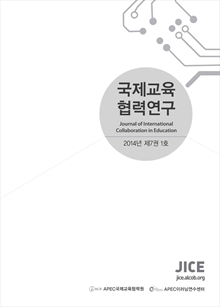간행물
국제교육협력연구지 Journal of International Collaboration in Education

- 발행기관 APEC국제교육협력원
- 자료유형 학술지
- 간기 반년간
- ISSN 2005-1190 (Print)2288-6389 (Online)
- 수록기간 2008 ~ 2014
- 주제분류 사회과학 > 교육학 사회과학 분류의 다른 간행물
- 십진분류KDC 371DDC 379
권호리스트/논문검색
제7권 제1호 (2014년 12월) 6건
1.
2014.12
구독 인증기관 무료, 개인회원 유료
Collective intelligence is important and necessary since it is a strong method to apply across the applicable areas in terms of educational scene of school and company, drawing up and operation of social policy as well as management aspect of company and to have a strong influence. In this regard, Ivan Illich criticized the function of education as one of a social evaluation system that injects what society wants from people, cultivates talents which society wants, rather than allowing people to learn and growth through a social education function of society, while applying destructive standards of social evaluation and culling people to those who do not follow such routes. Ivan Illich has made diverse and actual suggestions for becoming active learners as the society opens and connects various resource for the people to select by themselves rather than making people learn with an artificial education system. This suggestion gives considerable implications to the current online community beyond exclusively an off-line oriented community. Accordingly, this study aims to identify several limitations that educational application of collective intelligence has in the swirling era of change based on such suggestions of Ivan Illich and to present alternatives for this.
6,400원
2.
2014.12
구독 인증기관 무료, 개인회원 유료
Recently, there have been many discussions and research on the SMART-based education. However, there are so many un-touched issues and problems which relates with the quality of education and the applications of the SMART for educational practices, especially in schools. In order to approach these issues, this paper aims to start the discourse so that we can achieve the optimal knowledge and system for smart-based educational development.
4,800원
3.
2014.12
구독 인증기관 무료, 개인회원 유료
Information and communications technology(ICT) has been emerged as a powerful tool for extending educational opportunities in a global society. Integration of ICT is a key factor of an educational reform agenda in many developing countries. This study examines the current state of ICT facilities and educational environment in Ethiopia. Basic research on Ethiopia and Adama Science and Technology University and interviews with each stakeholder were conducted in order to reveal which factors play a role in the decision to adopt ICT.
4,500원
4.
2014.12
구독 인증기관 무료, 개인회원 유료
educational cooperation with Rep. of Sakha in recognizing the propbrloesmpes ctaivnde tnheee ds struedlayt edr etvoi eewdsu catthioen al liitnefroartmuraet izaotino n. cIunr retnhte psutrastuuist ofo f thies dupcuartpioosnea,l iinnffoorrmmaattiizoant ioann d ine duRcaetpi.o n osf ysSteamkh ai n aRndu ssidae vFeelodpemraetniot n sbteactuasu sef oer duncaattiioonnaall ssyysstteemm. oAf ntdh e fiReeldp ubstliucd yo f oSna kshcah oiosl st hean dp arutn iovfe rRsuitsiessia nu sFiendge rtahteio ne deudcuactaiotinoanl ienxfpoermrta tiinztaetriovnie wi n weSraek haal,s o siumrvpeleym efnotre d.e dTuhcaet iorensaul ltso ffoicf iatlhsi s asntdu dye dcuacna tiboen csounmdmitaiornizse d anda s prfisotlilonwe s.e nvFirroisntm, enSt akchoan taihnaisn g uanbiuqnudea ntc limmianteer, al greeosgoruarpcheics acnodm puttreera sunreytw. orLka ncdo nnmeacstsio, n tdhiifnfliyc ultp. opSuol,a tefudr thaerre ar,e seloacraclh adnivde rasnitayl ysmisa dine reengvairrodnsm etnot wthilel bRe eprbeliqcu ireodf. SSeackohnad's, mpoeroep leq, uanctuilttautrivee, aenddu caqtiuoanli tatainved rneesceeasrscahr y fotro ssuobljveec t thoef epdruocbaletimons iann d Sarkehcao gniniz e thteh efiro rmn eeodfs . suTrvheiryds, athree aanmaolynsgi s thoef cAoPuEntCr ierse gtihoant hisa ven eesdimedil art ol evuenldse rosft anedd uctahtei oncaul rriennfot rmeadtuiczaattiioonn itnrefonrdms atiaznatdi onp ocalinc iebse. prFersoemnt edt.his
5,500원
5.
2014.12
구독 인증기관 무료, 개인회원 유료
In recent years, the globalization has raised the interest in the overseas experiential learning. Overseas experiential learning has been playing an important role by learning from various cultures which enables the students to achieve the global insights and leadership. However, the regulations have not been properly established, and Ministry of Education tend to recommend not to travel abroad without a special purpose. The results were found that teachers seek the exchange program with the local students in the partner country, and, overall, the cost-effectiveness was relatively low. Also, with the fact that the revisit was not recommendable, the satisfaction of the previous activities has been questioned. Teachers agreed with the critical points on career development of middle school and high school students, and positively rated the suggested prototype of oversea experiential learning based on career education.
5,700원
6.
2014.12
구독 인증기관 무료, 개인회원 유료
에티오피아는 1994년을 기점으로 교육개혁을 시도하면서 보편적 교육 및 질 높은 교육 의 실현을 위한 기틀을 마련하였다. 특히, 두 목표를 실현하기 위해 1994년 교육개혁은 질 높은 교사의 수급을 위한 교사 양성소의 교육과정 변화 및 임금 인상에 따른 승진제도 마련 등의 유인책을 제도에 포함시켰다. 이러한 유인책에도 불구하고 여전히 에티오피아 내 교사수급은 현저한 문제점으로 지적되고 있으며 특히 질 높은 교사의 이직은 심각한 사 회적 문제로 부각되고 있는 실정이다. 따라서 본 연구는 에티오피아 교사들은 왜 이직을 하려고 하는 지에 대해 분석하고자 한다. 본 연구에서는 에티오피아 교사 승진제도 및 낮 은 임금 구조가 교사의 이직에 영향을 미친다는 결론에 도달한다. 첫째, 불투명한 승진구 도는 교사의 이직과 관련성이 있다. 둘째, 승진에 따른 정치관련 업무 증가는 교사의 이직 에 영향을 미친다. 셋째, 교육 및 정치의 연관성으로 인한 교직 내 민주적인 문화형성이 어렵다. 넷째, 승진으로 인한 급여 인상이 매력적이지 않다.
5,400원

